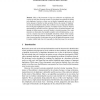Free Online Productivity Tools
i2Speak
i2Symbol
i2OCR
iTex2Img
iWeb2Print
iWeb2Shot
i2Type
iPdf2Split
iPdf2Merge
i2Bopomofo
i2Arabic
i2Style
i2Image
i2PDF
iLatex2Rtf
Sci2ools
135
click to vote
APWEB
2006
Springer
2006
Springer
The Case of the Duplicate Documents Measurement, Search, and Science
Many of the documents in large text collections are duplicates and versions of each other. In recent research, we developed new methods for finding such duplicates; however, as there was no directly comparable prior work, we had no measure of whether we had succeeded. Worse, the concept of "duplicate" not only proved difficult to define, but on reflection was not logically defensible. Our investigation highlighted a paradox of computer science research: objective measurement of outcomes involves a subjective choice of preferred measure; and attempts to define measures can easily founder in circular reasoning. Also, some measures are abstractions that simplify complex real-world phenomena, so success by a measure may not be meaningful outside the context of the research. These are not merely academic concerns, but are significant problems in the design of research projects. In this paper, the case of the duplicate documents is used to explore whether and when it is reasonable ...
APWEB 2006 | Comparable Prior Work | Complex Real-world Phenomena | Internet Technology | Large Text Collections |
Related Content
| Added | 20 Aug 2010 |
| Updated | 20 Aug 2010 |
| Type | Conference |
| Year | 2006 |
| Where | APWEB |
| Authors | Justin Zobel, Yaniv Bernstein |
Comments (0)

